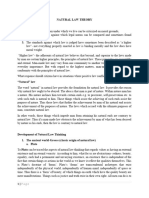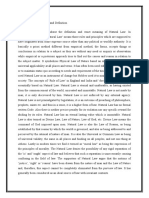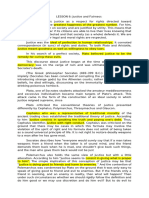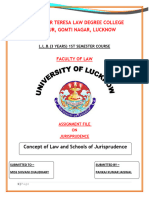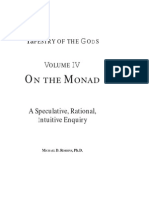0 ratings0% found this document useful (0 votes)
64 viewsChapter 4: Seminal Concepts (Philosophical Approach) : The Republic by Plato Classical Natural Law
Chapter 4: Seminal Concepts (Philosophical Approach) : The Republic by Plato Classical Natural Law
Uploaded by
Glyza Kaye Zorilla PatiagPlato discusses his view of law as seeking to discover true reality. He believes that ideal laws exist in the world of reality/forms and that man-made laws should strive to model these ideal laws. However, Plato acknowledges that human laws often fail to achieve this due to their general nature and inability to account for all particular cases. Ultimately, Plato comes to accept that while a philosopher-king would be ideal, fixed laws are preferable in practice to personal rule, as laws aim for justice despite their imperfections. Plato thus sees law as indispensable for structuring society, though not a perfect solution.
Copyright:
© All Rights Reserved
Available Formats
Download as DOCX, PDF, TXT or read online from Scribd
Chapter 4: Seminal Concepts (Philosophical Approach) : The Republic by Plato Classical Natural Law
Chapter 4: Seminal Concepts (Philosophical Approach) : The Republic by Plato Classical Natural Law
Uploaded by
Glyza Kaye Zorilla Patiag0 ratings0% found this document useful (0 votes)
64 views4 pagesPlato discusses his view of law as seeking to discover true reality. He believes that ideal laws exist in the world of reality/forms and that man-made laws should strive to model these ideal laws. However, Plato acknowledges that human laws often fail to achieve this due to their general nature and inability to account for all particular cases. Ultimately, Plato comes to accept that while a philosopher-king would be ideal, fixed laws are preferable in practice to personal rule, as laws aim for justice despite their imperfections. Plato thus sees law as indispensable for structuring society, though not a perfect solution.
Original Description:
Chapter 4
Original Title
Legal Philosophy
Copyright
© © All Rights Reserved
Available Formats
DOCX, PDF, TXT or read online from Scribd
Share this document
Did you find this document useful?
Is this content inappropriate?
Plato discusses his view of law as seeking to discover true reality. He believes that ideal laws exist in the world of reality/forms and that man-made laws should strive to model these ideal laws. However, Plato acknowledges that human laws often fail to achieve this due to their general nature and inability to account for all particular cases. Ultimately, Plato comes to accept that while a philosopher-king would be ideal, fixed laws are preferable in practice to personal rule, as laws aim for justice despite their imperfections. Plato thus sees law as indispensable for structuring society, though not a perfect solution.
Copyright:
© All Rights Reserved
Available Formats
Download as DOCX, PDF, TXT or read online from Scribd
Download as docx, pdf, or txt
0 ratings0% found this document useful (0 votes)
64 views4 pagesChapter 4: Seminal Concepts (Philosophical Approach) : The Republic by Plato Classical Natural Law
Chapter 4: Seminal Concepts (Philosophical Approach) : The Republic by Plato Classical Natural Law
Uploaded by
Glyza Kaye Zorilla PatiagPlato discusses his view of law as seeking to discover true reality. He believes that ideal laws exist in the world of reality/forms and that man-made laws should strive to model these ideal laws. However, Plato acknowledges that human laws often fail to achieve this due to their general nature and inability to account for all particular cases. Ultimately, Plato comes to accept that while a philosopher-king would be ideal, fixed laws are preferable in practice to personal rule, as laws aim for justice despite their imperfections. Plato thus sees law as indispensable for structuring society, though not a perfect solution.
Copyright:
© All Rights Reserved
Available Formats
Download as DOCX, PDF, TXT or read online from Scribd
Download as docx, pdf, or txt
You are on page 1of 4
CHAPTER 4: SEMINAL CONCEPTS (PHILOSOPHICAL APPROACH)
THE REPUBLIC By Plato
Classical Natural Law
Plato states that law seeks to be the discovery of reality.
- He arrived in this position based on the following argument:
SOCRATES: What is law?
Companion: What kind of laws do you mean?
SOCRATES: If there is any difference between law and law in the very point of being law, or if
gold differs from gold in being gold.
- To this the objection is made that speech is not the thing that is
spoken, nor is vision merely the visible things nor hearing the audible
things.
- Law must therefore be distinct from that which is accepted legal.
S: How would the law whereby they are thus accepted be defined?
- Socrates is here raising what we are accustomed to think of in modern
terms as the problem of authority
C: In this sense, Law is the decrees and pronouncements of the community, or, to state in
generally, law is the opinion of the state.
- Plato expresses it elsewhere, when a judgement of society takes the
form of a public decision, it has the name law.
Socrates observes that perhaps this is right, BUT he does not believe that the conversation has
reached the essence of the matter.
Law is a good thing, and public opinion is true opinion, and true opinion is the discovery of
reality.
Socrates, therefore, concludes that Law seeks to be the discovery of reality, or more precisely, it
is the true reality with respect to the administration of a state.
Nevertheless, it is common knowledge that the laws differ on the same subject matter.
Perhaps, Socrates suggest, Law may not always achieve its ideal of discovery of true reality. Still,
he adds, no society believes that the just can really be unjust. It is thus a universal rule that
Realities are accepted as real; whoever fails to reach reality, fails it find the law.
C: However, we are continually changing our laws in all sort of ways.
S: Perhaps it is because you do not reflect that when we change our pieces of draughts they are
the same pieces.
Those who know always accept the same views; they will not write differently
at different times on the same mattes, nor will they ever change one set of accepted
rules of another in respect of the same matters.
If we see some persons anywhere doing this, we can say that they are mistaken
in what they describe law, then that law is mere appearance and ought not to be
accepted to be asserting a distinction between principles and rules.
In holding that law seeks to be the discovery of reality, Plato was defining its proper sphere in his
philosophical view of the world.
Platonic system the general theory of Forms and Ideas
o Plato offers another definition of law as opportionment of reason.
o What did Plato mean by reality?
He tentatively defined it as POWER, by which he meant that anything has real
existence if it is inherent in it the power of being affected or of affecting others, no
matter how small.
However, Plato remarks, the easy use of words and phrases and the avoidance of
strict precisions is in general a sign of good breeding; indeed, the opposite is hardly
worthy of a gentleman.
o When Plato asserted that law was the discovery of true reality, he appeared to mean that
the moral value of law increases as it approximates the ideal law which exists in the world is
reality.
o The philosopher in the Platonic system is one who knows true reality and who therefore
knows what the ideal thing to do is.
o If the philosopher is a king, he will prescribe laws for the state based upon the ideal
laws which he has perceived in the world of reality. They will therefore be the best
possible laws, and by following them, the members of the community will be
directed to the way of good life. Thus, the laws of a city, if they are of moral worth,
must be modeled upon the laws of reality so that they are the objective expression
in the state structure of the system ideas which alone represents the real.
There are obscurities in Platos view on the nature of law and gaps in his reasoning.
o He raised many problems which have been the staple juristic thought from this day down to the
present time.
o His first question, literally in the first sentence of the dialogue, still remains the first question
asked of itself by every school of legal though: What is law?
He did not distinguish between society and the state nor between ethics and politics.
There was only one place for the realization of the good life and that was in the
community.
o Plato prepared the way for natural law speculation and the perception of the ideal element in
law making.
He answers the commonplace distinction between nature and convention by setting in
opposition the theory of ideas which leads him to the conclusion that the Law is
discovered and not invented.
He puts forward the theory that law is an instrument of social control and thus suggests
the problem of end of law.
o He raises for later speculation the question of the relation between the state and law.
o The connection between law and morals was never absent in his thought. By suggesting that law
might be defined as the aggregate of laws, he anticipated the position which was taken by the
majority of jurist from the middle ages to the analytical jurists and beyond.
o He made clear the function of principle in the construction of legal system.
o He was, in all this, the first to exhibit the possibility of a general science of law.
The Function of Law
Three hypotheses are assumed as the basis of Platos thinking about law.
1. He held that end of law was to produce men who were completely good.
2. Human nature was capable of almost unlimited modification;
3. The method to be used was a benevolent dictatorship: philosophers must be kings or kings must be
philosophers.
As a philosopher, Plato could not accept anything less than complete goodness in men; he therefore rejected all
laws that did not incline to the end.
A bad law is a no law.
Plato was wedded to his belief in the malleability of human nature, and he had no doubt that the children would
accept the new laws even if the parents would not.
The doctrine of philosopher-king represents the principle that the government is an art or science as opposed to
the politicians idea of government by oratory under law.
That this doctrine is merely a further expression of his theory of ideal postulates and the combination of
intellectual and moral perfection it envisages has never been known on this earth and is priori fictional;
That it is a recognition of the demand that the State be ruled by the highest available intelligence, and
represents only the autocratic discretion by true shepherd, pilot, or physician;
And finally that in practice to everywhere yields to the reign of law and the consent of the governed.
Was Plato hostile to law?
There is no doubt that as a seeker after an ideal the Plato of the Republic preferred the adaptable
intelligence of the all-wise autocrat to the impersonality of the rule of law. As it appeared on this earth, it was the
despot of mankind and often forced men to do many things which were opposed to nature.
In the nature if things, law is aimed at the impossible. Through the medium of the fixed, inflexible general
laws sought to direct men and actions which were constantly changing and always different. In such system, it was
impossible to avoid the hard case.
Plato knew the simple truth, that the debating method of the courtroom, as distinguish from cross
examination, was perhaps least likely to lead to the discovery of truth.
In laws and Statesman, Plato had come to realize that on this earth benevolent dictatorship was a counsel of
perfection and that he would better propose a solution which had a possibility of realization.
Plato, therefore, believed that society should fall back to law as second best, perhaps even as something in the
nature of a pis aller, the supremacy of the rigid rule adapted to average man and the general situation and
incapable of dispensing equity in the particular case. He had no doubt whatever that fixed laws are to be preferred
to the personal administration of the unscientific ruler which the society usually receives.
Plato, thus, came to the final view on the necessity of law.
He insisted that it was indispensable; without it we were indistinguishable from animals.
Its noblest work was to make men hate injustice and love justice.
The laws are intended to make those who use them happy; and they confer every sort of good.
It was hard for men to perceive that the preoccupation of social science was with the community and not
with the individual; loyalty to the communitys interest bound a state together; the pursuit of the
individuals interest tore it us under.
He stated that it was hard for men to see also that the interests of both alike were better served by the
communitys prosperity than by that of the individual. There was not among us whose natural equipment
enable him both to see what is good for men as members of the community, and on seeing it, always be
both able and willing to act for the best.
Irresponsible power for mortal men always led to grasping and self-interested action, or as Acton was to
rephrase it later, all power corrupts and absolute power corrupts absolutely.
Law the generality of which could not always do justice to particular cases.
Plato represents completely his ideal concept of the state.
The state, for Plato, is a man on a large scale.
It is a perfect organism, indeed the most perfect unit.
It is a whole form of various individuals and solidly built, as a body is formed of several organs, which
together make its life possible.
Both in the individual and the State, there must reign that harmony which is obtained through virtue.
Justice is the virtue par excellence, insofar as it consists in a harmonic relation between the various parts of the
whole. Justice requires that each one do his part, in relation to the common purpose.
3 parts of faculties exist in the soul of the individual:
o Reason which dominates
o Courage which acts
o Sense which obeys
Similarly, in the State, three classes are distinguished:
o The wise, destined to dominate
o The warriors, who must defend the social organism
o The artisans and farmers, who must feed it.
As the individual dominated by reason, so is the State by the class which represents precisely wisdom, by the
philosophers.
The cause of participation in and the submission of the individual to the State is the lack of autarchy, the
imperfection of the individual, and his insufficient by himself. The perfect being which is sufficient unto itself,
which absorbs and dominates all is the State.
The purpose of the State is universal. It includes in its attributes the entire life of the single individuals.
The state has for its purpose the happiness of all through the medium of the virtue of all. It is to be noted, the
classical Greek philosophy, happiness and virtue are not antithetical terms, and rather, they coincide, because
happiness is the activity of the soul according to virtue, according to its true nature.
The State, therefore, according to Plato, dominates human activity in all its manifestations. Upon its rest the duty
to promote good in its every form. The power of the State is limitless. Nothing is reserved exclusively to the will of
the citizens. All comes under the competence and the intervention of the State.
The idea that every individual has certain fundamental rights on his own is entirely lacking. The state dominates in
absolute fashion. To render stronger and closer-knit the political organization, Plato suppresses social entities
which are intermediate between the individual and the State.
By Plato, at any rate, the personality of man is not adequately recognized.
In the Dialogue, Laws, Plato shows a greater respect for individual personality, always, however, that of free men
only, slaves excluded. Family and property are conserved, no longer sacrificed. The authority of the State,
however, remains nevertheless great and overpowering.
As to political forms, Plato criticizes both monarchy and democracy, wherein one part of the citizens commands
and the other serves. He proposes a sort of synthesis, a mixed government.
You might also like
- Jurisprudence NotesDocument31 pagesJurisprudence Notessuruchiba2049No ratings yet
- Philo 4Document1 pagePhilo 4raphaela grazia ramosNo ratings yet
- SEMINAL CONCEPTS (Philosophical Approach) The Republic by Plato Classical Natural LawDocument10 pagesSEMINAL CONCEPTS (Philosophical Approach) The Republic by Plato Classical Natural LawLyleThereseNo ratings yet
- Platonic Philosophy and Natural LawDocument7 pagesPlatonic Philosophy and Natural LawMary Jane Ubaldo QuibilanNo ratings yet
- Chapter Two: 2.1. The Sophists and Socrates SophistsDocument9 pagesChapter Two: 2.1. The Sophists and Socrates SophistsThal Nay Zar SoeNo ratings yet
- Tutorial 2Document7 pagesTutorial 2Tharshinie MenonNo ratings yet
- Greek Philosophy: Submitted By: Harshita Das Ba Hons (Philosophy) First Year ROLL NO. 192609Document9 pagesGreek Philosophy: Submitted By: Harshita Das Ba Hons (Philosophy) First Year ROLL NO. 192609PRONo ratings yet
- In Philosophy, It Is "The Science or Doctrine That Attempts To Explain The Universe in Terms of Ends or Final Causes"Document2 pagesIn Philosophy, It Is "The Science or Doctrine That Attempts To Explain The Universe in Terms of Ends or Final Causes"Delsie FalculanNo ratings yet
- Theoretical and Philosophical Basis On The Rule of LawDocument16 pagesTheoretical and Philosophical Basis On The Rule of LawJuliet ChisomNo ratings yet
- Jurisprudence NotesDocument32 pagesJurisprudence Notesdilkhush ChoudharyNo ratings yet
- Classical NaturalismDocument12 pagesClassical NaturalismSyahirah ArifNo ratings yet
- What Is The Relationship Between Justice and Law?Document3 pagesWhat Is The Relationship Between Justice and Law?zephyryuNo ratings yet
- Art 62Document6 pagesArt 62qobomqulwagovNo ratings yet
- Juris 4Document144 pagesJuris 4lamimangistu39No ratings yet
- Classical NaturalismDocument12 pagesClassical NaturalismNits0% (1)
- TeleologicalDocument6 pagesTeleologicalLeiya Lansang100% (3)
- LJU4801 RevisionDocument36 pagesLJU4801 RevisionPrudance100% (3)
- Jurisprudence 3Document144 pagesJurisprudence 3fikirjohn8No ratings yet
- justice in western thought AristotleDocument5 pagesjustice in western thought AristotleGanesh JadhavNo ratings yet
- Legal Philosophy Study Mat - 07.26.2023Document3 pagesLegal Philosophy Study Mat - 07.26.2023John Vincent BalilisNo ratings yet
- CHAPTER 02 - Part II - Natural Law - Classical and Modern Natural Law TheoryDocument19 pagesCHAPTER 02 - Part II - Natural Law - Classical and Modern Natural Law Theorydloizides2446No ratings yet
- Philo OflawnotesDocument4 pagesPhilo OflawnotesDinn Glea Marie CadayNo ratings yet
- Priya A Jagadish Course Teacher: Jurisprudence JSS Law College, Autonomous MysuruDocument24 pagesPriya A Jagadish Course Teacher: Jurisprudence JSS Law College, Autonomous MysuruVENKAT SNo ratings yet
- Jurisprudence Shortened Teaching MaterialDocument305 pagesJurisprudence Shortened Teaching Materiallamimangistu39No ratings yet
- Legal Philosophy For FilipinosDocument3 pagesLegal Philosophy For FilipinosNylinad Etnerfacir ObmilNo ratings yet
- Cairns, What Is LawDocument31 pagesCairns, What Is Lawchr_maxmannNo ratings yet
- PlatoDocument3 pagesPlatoJethro MadriaNo ratings yet
- Lecture 2Document16 pagesLecture 2Promise Alex WalkerNo ratings yet
- PLATODocument14 pagesPLATOharshitmathur24102No ratings yet
- Summary A.P D' EntrevesDocument3 pagesSummary A.P D' EntrevesDesi Lorentz Aryanti100% (2)
- JurisprudenceDocument50 pagesJurisprudenceIzuora EdNo ratings yet
- Jurisprudence Assignment 1Document8 pagesJurisprudence Assignment 1Bobo ChandaNo ratings yet
- Natural Law and Positive Law (1949)Document19 pagesNatural Law and Positive Law (1949)akinvasionNo ratings yet
- Natural LawDocument10 pagesNatural LawJEFFERSON MWITINo ratings yet
- Submit Your Homework Here. Starting Next Meeting, Class Will Start at 5:30pm and Will End at 8:30pmDocument16 pagesSubmit Your Homework Here. Starting Next Meeting, Class Will Start at 5:30pm and Will End at 8:30pmAndrea Gural De GuzmanNo ratings yet
- Jurisprudence NotesDocument8 pagesJurisprudence NotesprathabarlaNo ratings yet
- Berges PDFDocument19 pagesBerges PDFleafyedgeNo ratings yet
- The Essential Functions of Legal ProcessDocument32 pagesThe Essential Functions of Legal Processshrikrishna bhatNo ratings yet
- Joseph Raz - About Morality and Nature of LawDocument15 pagesJoseph Raz - About Morality and Nature of LawCatharine Black Lipp JoãoNo ratings yet
- JurisDocument11 pagesJurisUjjwal AnandNo ratings yet
- JusticeDocument3 pagesJusticejessabelaragon406No ratings yet
- Plato'S Concept of Justice As Virtue ABSTRACT: in His Philosophy Plato Gives A Prominent Place To The Idea of Justice. PlatoDocument4 pagesPlato'S Concept of Justice As Virtue ABSTRACT: in His Philosophy Plato Gives A Prominent Place To The Idea of Justice. PlatoManjare Hassin RaadNo ratings yet
- Plato's TheoryDocument6 pagesPlato's TheoryZaheen Nuz ZamanNo ratings yet
- Plato's JusticeDocument25 pagesPlato's JusticeManjare Hassin Raad100% (1)
- Normative Ethical TheoriesDocument13 pagesNormative Ethical TheoriesMohasin Niloy Ahmed 2121497642No ratings yet
- JURISPRUDENCEDocument19 pagesJURISPRUDENCEpankajjaiswalkumarNo ratings yet
- Aquinas LawsDocument7 pagesAquinas LawsAviral MauryaNo ratings yet
- Nature and Functions of LawDocument5 pagesNature and Functions of Lawh5jwnkj4znNo ratings yet
- Schools of Jurisprudence.Document24 pagesSchools of Jurisprudence.Gukiina Patrick100% (1)
- Bishop Stuart University Name: Faculty: Law Course:: Nuwagira AllanDocument10 pagesBishop Stuart University Name: Faculty: Law Course:: Nuwagira Allanmujuni brianmjuNo ratings yet
- Interplay Between Law & Social ChangeDocument20 pagesInterplay Between Law & Social Changedanish_1985No ratings yet
- Legal Systems and Methods NotesDocument13 pagesLegal Systems and Methods NotesmaiyokipkosgeiNo ratings yet
- Philo PlatoDocument2 pagesPhilo PlatoAlbert AgnesNo ratings yet
- Chapter 3 Teleological PerspectiveDocument15 pagesChapter 3 Teleological PerspectiveChienette MedranoNo ratings yet
- Natural LawDocument23 pagesNatural LawSoumen MukherjeeNo ratings yet
- Unit 1 (LAW)Document75 pagesUnit 1 (LAW)Kathuria AmanNo ratings yet
- Critically Examine Plato's Theory of JusticeDocument3 pagesCritically Examine Plato's Theory of JusticeEman FatimahNo ratings yet
- Insurance Cases Summer (Digests)Document3 pagesInsurance Cases Summer (Digests)Glyza Kaye Zorilla PatiagNo ratings yet
- Cases 1.escraDocument16 pagesCases 1.escraGlyza Kaye Zorilla PatiagNo ratings yet
- Sales Digests2Document1 pageSales Digests2Glyza Kaye Zorilla PatiagNo ratings yet
- Affidavit of AccidentDocument1 pageAffidavit of AccidentGlyza Kaye Zorilla PatiagNo ratings yet
- Spouses Lansang V. Court of Appeals G.R. No. 76028, April 6, 1990 FactsDocument11 pagesSpouses Lansang V. Court of Appeals G.R. No. 76028, April 6, 1990 FactsGlyza Kaye Zorilla PatiagNo ratings yet
- Rem CaseDocument7 pagesRem CaseGlyza Kaye Zorilla PatiagNo ratings yet
- Partnership CasesDocument26 pagesPartnership CasesGlyza Kaye Zorilla PatiagNo ratings yet
- CasesDocument120 pagesCasesGlyza Kaye Zorilla PatiagNo ratings yet
- Generosa Almeda Latorre V. Luis Esteban Latorre (G.R. No. 183926, March 29, 2010)Document53 pagesGenerosa Almeda Latorre V. Luis Esteban Latorre (G.R. No. 183926, March 29, 2010)Glyza Kaye Zorilla PatiagNo ratings yet
- Soc Leg Cases 3Document55 pagesSoc Leg Cases 3Glyza Kaye Zorilla PatiagNo ratings yet
- Practice Court: Court Observation ReportDocument6 pagesPractice Court: Court Observation ReportGlyza Kaye Zorilla PatiagNo ratings yet
- Social Legislation (Cases 1)Document8 pagesSocial Legislation (Cases 1)Glyza Kaye Zorilla PatiagNo ratings yet
- Ipl DigestDocument6 pagesIpl DigestGlyza Kaye Zorilla PatiagNo ratings yet
- Cases EscraDocument37 pagesCases EscraGlyza Kaye Zorilla PatiagNo ratings yet
- The Veterans Federation of The Philippines vs. Hon. Angelo T. Reyes and Hon. Edgardo E. Batenga G. R. No. 155027, February 28, 2006 FactsDocument10 pagesThe Veterans Federation of The Philippines vs. Hon. Angelo T. Reyes and Hon. Edgardo E. Batenga G. R. No. 155027, February 28, 2006 FactsGlyza Kaye Zorilla PatiagNo ratings yet
- Metaphysical Foundations of Natural LawDocument43 pagesMetaphysical Foundations of Natural Lawtinman2009No ratings yet
- Revo Answer, Affirmative Defenses & Crossclaim - Rob Stewart Wrongful Death CaseDocument89 pagesRevo Answer, Affirmative Defenses & Crossclaim - Rob Stewart Wrongful Death CaseMostly Stolen ProductionsNo ratings yet
- Astral Projection Truth Newsletter Issue 1, 21-May-2005, Frank J KeppleDocument12 pagesAstral Projection Truth Newsletter Issue 1, 21-May-2005, Frank J Kepplelilli-pilli100% (1)
- SSII JRRG v7 fs12-13Document5 pagesSSII JRRG v7 fs12-13Jan Robert Ramos GoNo ratings yet
- Belief Change Process - Parte2Document1 pageBelief Change Process - Parte2Saulo MourãoNo ratings yet
- Contradiction Tautology Contingent Tautology ContingentDocument2 pagesContradiction Tautology Contingent Tautology ContingentMs. CharmyNo ratings yet
- Honesty Is The Best PolicyDocument4 pagesHonesty Is The Best PolicyJacyntha KohNo ratings yet
- Lesson 3 FunctionsandphilosophicalperspectivesonartDocument38 pagesLesson 3 FunctionsandphilosophicalperspectivesonartJef JepoyNo ratings yet
- Al Attas Islam and SecularismDocument215 pagesAl Attas Islam and SecularismŠumi Amel Šuman100% (5)
- Introduction To Literary CriticismDocument14 pagesIntroduction To Literary CriticismNihal ScorNo ratings yet
- Levinson - Chapter 6 - Part IDocument24 pagesLevinson - Chapter 6 - Part IMaria Bordei0% (1)
- (Glissant) Édouard Glissant - in Praise of The Different and of DifferenceDocument8 pages(Glissant) Édouard Glissant - in Praise of The Different and of DifferencejuguerrNo ratings yet
- VRTS - 10-13-20Document1 pageVRTS - 10-13-20Aina Saunar VargasNo ratings yet
- Efficient CausationDocument395 pagesEfficient CausationAditya Singh100% (3)
- The I Ching Lifes GPSDocument152 pagesThe I Ching Lifes GPSKátia Nishida FigueiredoNo ratings yet
- The Meaning of Pragmatism: The Ethics of Terminology and The Language of PhilosophyDocument21 pagesThe Meaning of Pragmatism: The Ethics of Terminology and The Language of PhilosophyAdel OmarNo ratings yet
- On The MonadDocument236 pagesOn The MonadTech55No ratings yet
- Ultimate Guide - Mastering Negative EmotionDocument31 pagesUltimate Guide - Mastering Negative Emotionjack thompsyNo ratings yet
- Teachings of VallalarDocument57 pagesTeachings of VallalarRameshkumar ChandrasekaranNo ratings yet
- RPH ReviewerDocument15 pagesRPH ReviewerJosca Villamor BasilanNo ratings yet
- Konsep DiriDocument8 pagesKonsep DiriLove StoryNo ratings yet
- Fallacies: What Are They?Document13 pagesFallacies: What Are They?Angelica BrionesNo ratings yet
- NYU Interview StrategiesDocument9 pagesNYU Interview StrategiesBernando VialliNo ratings yet
- Editor's Desk: The Wellness Movement: Ideas For Improving Health OutcomesDocument13 pagesEditor's Desk: The Wellness Movement: Ideas For Improving Health OutcomesLázaro Alejandro Moynelo DíazNo ratings yet
- Pretest in Research 2Document2 pagesPretest in Research 2Angelica BascoNo ratings yet
- Andersen - Nietzsche's Will To Power As A Doctrine of The Unity of Science 727299819Document18 pagesAndersen - Nietzsche's Will To Power As A Doctrine of The Unity of Science 727299819Miguel ReyesNo ratings yet
- Alvin - Goldman - and - Dennis - Whitcomb (Eds) - Social - Epistemology - Essential - Readings - 2011 PDFDocument368 pagesAlvin - Goldman - and - Dennis - Whitcomb (Eds) - Social - Epistemology - Essential - Readings - 2011 PDFOvejaNegra100% (2)
- Artificial Intelligence NotesDocument18 pagesArtificial Intelligence Notesaustrina8307No ratings yet
- Cardinal CrossDocument7 pagesCardinal CrossjakilaNo ratings yet
- The Higher Metaphysics 1000041877Document68 pagesThe Higher Metaphysics 1000041877sean lee100% (10)

































